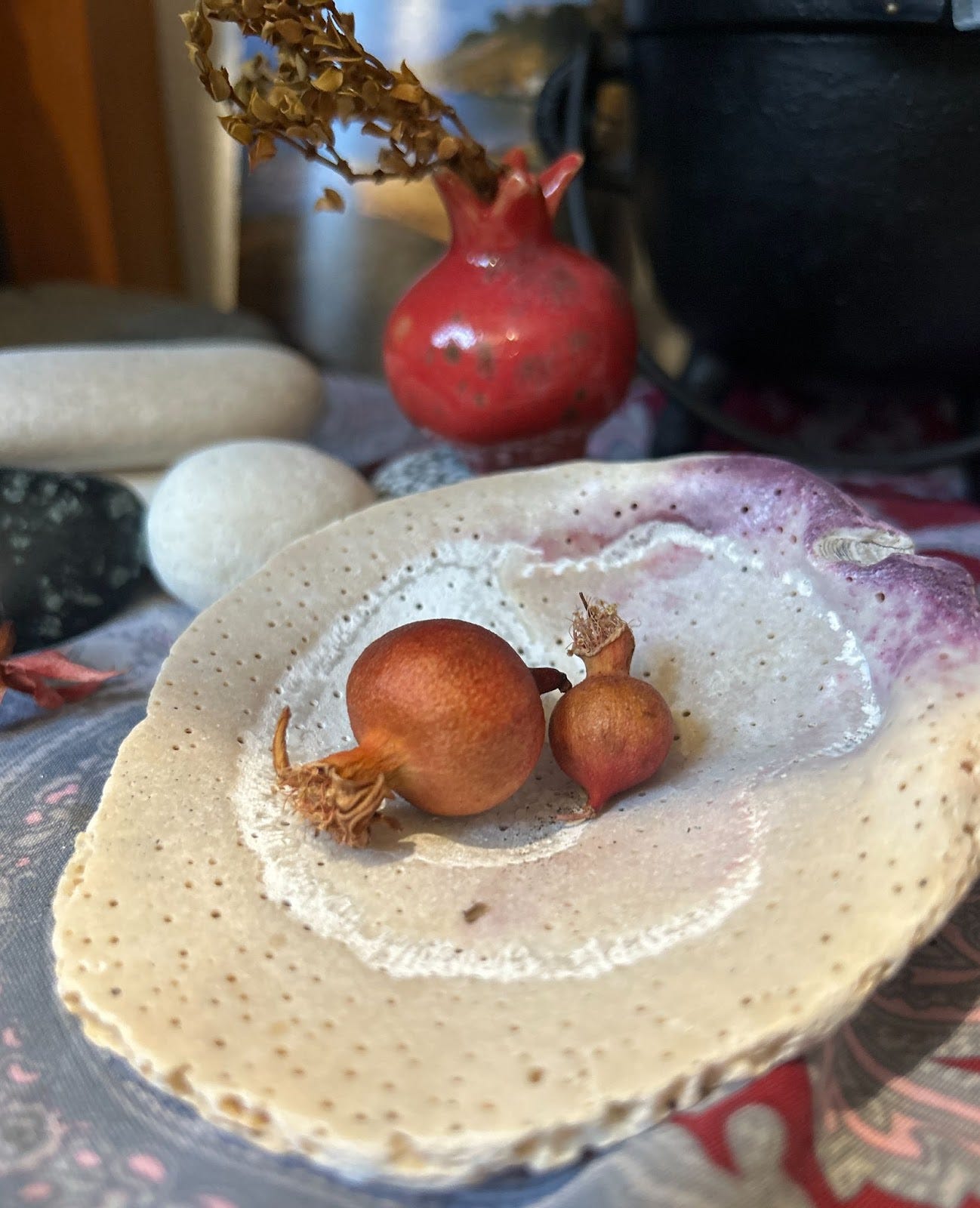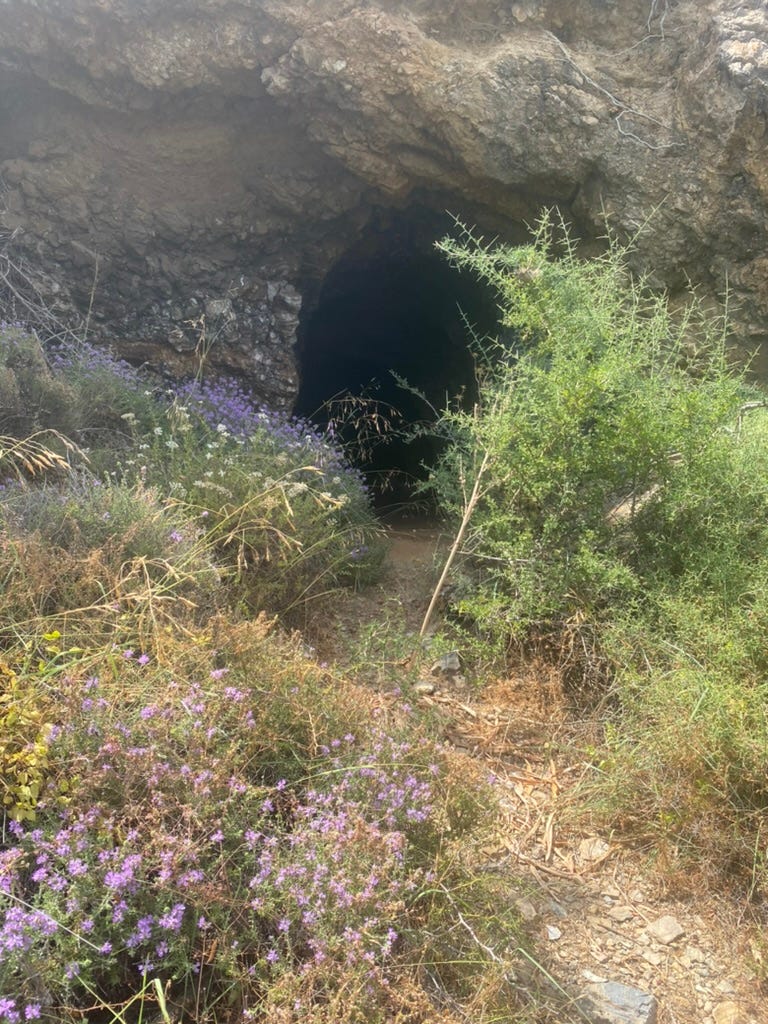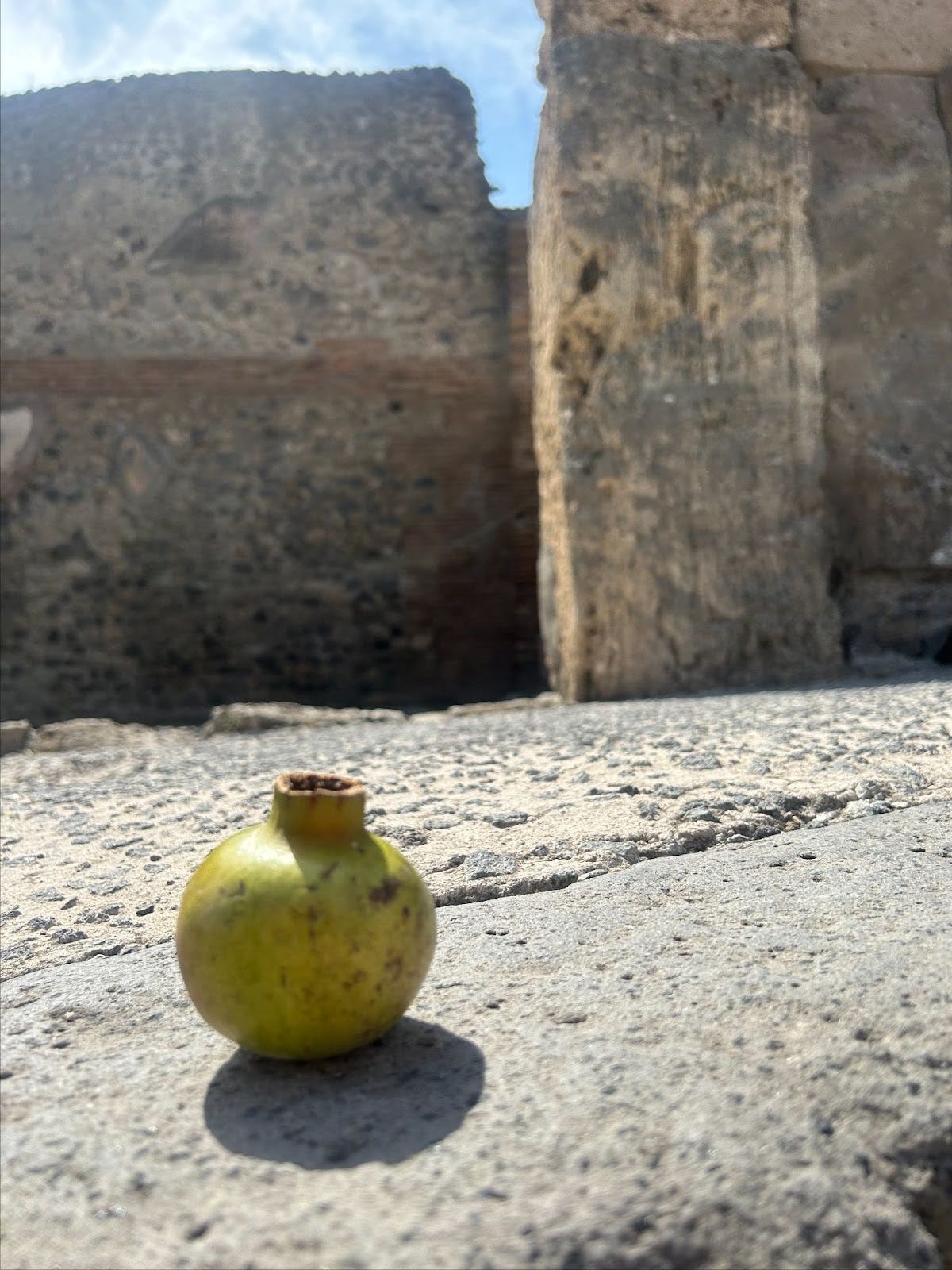The Specter of a Story
(And What Demeter Knows about Motherhood)
Demeter has been bugging me all week. Remember Demeter, the Greek goddess of the harvest and the anguished mother of Persephone? Persephone, who was stolen from her mother by Hades and ate the pomegranate seeds that sealed her destiny as the Queen of the Underworld. Demeter, the reason winter came to the world.
I thought this week I’d write about how we carry stories in our bodies, but every time I sit down to write, every time I let my mind roll around in ideas about stories stored in bodies, Demeter pops up: I pull a card to focus my writing time, and there is Demeter holding sheaves of wheat and looking forlorn. I dream my baby niece calls me Auntie Narmila, and when I google the name, I discover one meaning is ‘pomegranate blossom.’
Fine. You’ve got my attention.
Yesterday, I remembered that I’d written something about Demeter and Persephone in The Scrapheap. It’s weird revisiting old posts. Weird like when I see a picture of myself with a haircut that looked cute a couple years ago but might not suit me today. Almost two years ago, I wrote this post about the spaciousness of empty nesting colliding with the constrictions of Crohn's Disease: Spaciousness
Here’s what I said about Persephone and Demeter:
When my daughter was young, I told her the story of Persephone and Demeter as a coming of age adventure. In my version, Persephone chose to go to the underworld. It was time for her to understand her own potential, begin to know herself as a being separate from her mother. In order to grow, Persephone needed space from her mother, so she ate the seeds.
I have a tattoo of Demeter on my left arm for my son, Dimitri, and a tattoo of the three graces on my right arm for my daughter, Graciela. It's like holding my children, even as they grow into their adult lives. I became a mother before I knew what being an adult meant. I did not know how to separate the identity of mother from my understanding of myself.
When I wrote that, I was wrestling with the fragmented relationship I had with my mother who was rapidly drifting away from us and towards death. I was focused on the daughter’s version of the story, on her need to find herself in the world separate from her connection to her mother. I needed Persephone’s story to be the predominant message of the myth, so I could make sense of my relationship with my mother. In fact, I’ve only ever thought about this story through the lens of Persephone.
But this week, it was Demeter who spoke to me. Looking at the myth from Demeter’s perspective, another idea begins to take hold. By shutting down the world until her daughter’s return, Demeter is asserting her version of reality as the most important version. She’s not really seeing the truth of her daughter’s descent, the necessary break Persephone is making from her mother. Demeter is immersed so deeply in the story of their relationship as she sees it, that she is blind to Persephone’s experience.
Demeter reminded me of what I’ve discovered over the past several months: Learning to be a parent to young adults is more complex than just letting go and accepting our children’s autonomy. It also means validating the stories our children carry about how they were raised and accepting their version of reality.
That’s a hard one because damn parenting is hard and damn I did the very best I could with what was available to me emotionally, financially, culturally and damn sometimes kids don’t see the gaping holes of grief and anxiety and the weight of trying to crawl out from under all that family of origin crap and oh the fear of repeating repeating repeating that history. And also it hurts when our kids don’t see us, really see us. But do we ever really see our parents? There’s so much haunting the relationship between a parent and their child, so many pomegranate seeds to contend with. I did my best doesn’t say enough. I hear you and I believe you might say more.
My tattoo of Demeter is over twenty years old and has faded into a specter of itself. I wonder about how something—an idea or a symbol—that seems so permanent, so true, can become ethereal (thank you Nancy Miller for your beautiful post Ethereal Daughter, which got me pondering ethereality). What is it that makes something that seems solid—like my understanding of motherhood—start losing substance and sense? My tattoo is still a mother’s tattoo for her child. I’ve thought of it as a kind of protection spell for my sweet Pisces boy who was born into a world where masculinity has been misrepresented and perverted into something callous and violent. But as my relationship to the story of Demeter and Persephone evolves, as my relationship to my children and to motherhood transforms, my Demeter tattoo is taking on a new significance, my old ideas fading like the tattoo.
I could reach for the easy symbol of Demeter as earth, as seasons and cycles, and that will always hold some truth, but there is something more I’m reaching towards. It begins almost as soon as we are born, this reaching towards autonomy, this collecting of stories about the world we experience and the role our parents play in it. These stories often contradict and collide with our parents’ stories. What if my mother had said to me I hear you and I believe you?
I suppose Demeter has been trying to tell me that the thing I thought I wanted to write about is also the thing she wants me to understand. Stories change depending on who carries them. I think Demeter came along to remind me that my version of the story is only my experience of motherhood and there is something valuable in listening to my children’s versions of their childhood, even if I don’t always want to believe them.
Coming Soon: Paid Subscriptions for The Scrapheap
That’s right! Next month, The Scrapheap will offer paid subscriptions. For folks who continue to subscribe for free, you’ll still receive essays from Jenn and Sarah on healing and creative process. For folks who follow us into the world of paid subscriptions, you'll also receive subscriber-only essays and prompts designed to support and grow your relationship to joyful practice.
We’re excited to expand the ways we are engaging with the Substack community, and we hope you will join us by subscribing.






Much of parenting is humbling, but the MOST humbling part so far has been hearing my adult children assess their upbringing. The Demeter perspective adds a beauty to this process that cools the burn of it. Should we call this pomegranate colored glasses?